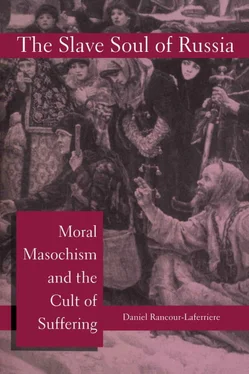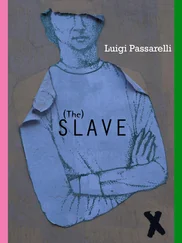As David Brodsky observes: “The anecdote shows the peasant’s complicity in his own exploitation by a frivolous ruling elite.” 80
Another foreign visitor to Russia, Astolphe de Custine (1790—1857) had much to say on the subject of Russian slavishness. Custine was a French marquis who, having met Mickiewicz beforehand, 81spent a summer traveling in Russia. His book, La Russie en 1839 , was a great success in France and was very controversial in Russia, where it was read by many despite the ban on it there. 82
Custine visited various Russian cities, including Petersburg (then the capital), Moscow, Iaroslavl, and the great trading center of Nizhnii Novgorod. He also stayed in the lice-infested roadside inns of many small villages. No matter where he traveled in “the empire of the tsar” the overwhelming impression he received was one of gloom and misery: “the life of the Russian people is more gloomy [triste] than that of any other of the European nations; and when I say the people [le peuple], I speak not only of the peasants attached to the soil, but of the whole empire.” 83Indeed, according to Custine, Russia is a society in which “no happiness is possible.” 84
The primary source of this unhappiness is the slavish attitude of Russians toward authority of any kind. This applies to all Russians, not just serfs (compare Olearius’s previous declaration, “They are all serfs and slaves,” 85or Chaadaev’s assertion that there is no visible difference between a serf and a free person in Russia, 86or Masaryk’s later statement that “both slaves and lords have servile souls”). 87
Russian nobles, for example, are not like the cultivated, independent aristocrats of France and Germany, but are ambitious, fear-ridden individuals who are always trying to appease the tsar and other higher authorities. Thus the courtiers surrounding the Hereditary Grand Duke impress Custine with their hypocritical behavior: “What has chiefly struck me in my first view of Russian courtiers is the extraordinary submissiveness with which, as grandees, they perform their devoirs . They seem, in fact, to be only a higher order of slaves; but the moment the Prince has retired, a free, unrestrained, and decided manner is re-assumed, which contrasts unpleasantly with that complete abnegation of self, affected only the moment before;” 88“there are slaves everywhere,” says Custine, “but to find a nation of courtly slaves it is necessary to visit Russia.” 89
Custine was an aristocrat whose father and grandfather were guillotined by French revolutionaries, so it is not surprising that he hoped to find evidence in Russia to support the idea of autocratic rule. But Russia changed his mind: “I went to Russia to seek for arguments against representative government, I return a partisan of constitutions.” 90Having now experienced a “nation of slaves” 91Custine can declare that “a peasant in the environs of Paris is freer than a Russian lord.” 92
The idea of Russia as a “nation of slaves” seems to have been in the air by the late 1830s. Around the time the first edition of Custine’s book appeared, the poet Mikhail Lermontov (1814–41) wrote a poem, now famous, about Russian authoritarianism:
Прощай, немытая Россия,
Страна рабов, страна господ,
И вы, мундиры голубые,
И ты, им преданный народ.
Быть может, за стеной Кавказа
Сокроюсь от твоих пашей,
От их всевидящего глаза,
От их всеслышащих ушей. 93
Farewell, unwashed Russia,
Land of slaves, land of masters,
And you, blue uniforms,
And you, people, devoted to them.
Perhaps beyond the wall of the Caucasus,
I will hide from your pashas,
From their all-seeing eye,
From their all-hearing ears. 94
Russia is here personified. She is “unwashed,” as a person would be, she is spoken to (“Farewell”), as one would speak to a person. Her person is multiplied by the many who occupy her—the “slaves,” the “masters,” and the “pashas” (i.e., the tsarist gendarmes). She is despicable not only for her oppressors, but also for her oppressed who seem to welcome their oppression, who appear to be united in their willingness as one collective people (“narod”) to obey the oppressors (“devoted people,” or, in other variants, “obedient [poslushnyj] people” or “submissive [pokornyj] people”). 95Lermontov’s contempt for the “land of slaves” is clearly very much in the spirit of Custine’s critique of the “nation of slaves.”
Given that so many accomplished writers—Radishchev, Chaadaev, Mickiewicz, Custine, and Lermontov 96—had already dealt with the phenomenon of Russian slavishness by the middle of the nineteenth century, it is not difficult to understand why the definition of Russia as a “land of slaves” has stuck. It is now a topos taken for granted by many scholars of Russia. For example, writing in a 1992 issue of The Times Literary Supplement Leszek Kolakowski was able to speak of a “gloomy image of the eternal Russia, country of slaves,” 97without bothering to use quotation marks or to mention his nineteenth-century predecessors in this matter.
Even the “iron tsar,” Nicholas I, with whom Custine spoke personally, admitted to the sadomasochistic nature of his government’s relationship with the Russian people: “Despotism still exists in Russia: it is the essence of my government, but it accords with the genius of the nation .” 98For this despotic “essence” to accord with the nation’s “genius” implies that Nicholas was indeed dealing with a “nation of slaves.” The people ruled by Nicholas took, in his own view, a specifically masochistic stance with respect to his “despotism.” Psychoanalysis offers a more straightforward terminology than the euphemistic phrase “genius of the nation [le génie de la nation]” uttered in French by the Russian tsar.
So, the Russian people have a genius for masochism. This talent, in Custine’s estimation (although not in his terminology), applies to the lower as well as to the higher social orders, but in the former actual physical violence is very often involved as well:
Here, among a thousand, is another example. The postillion who brought me to the post-house from whence I write, had incurred at the stage where he set out, by I know not what fault, the wrath of his comrade, the head hostler. The latter trampled him, child as he is, under his feet, and struck him with blows which must have been severe, for I heard them at some distance resounding against the breast of the sufferer. When the executioner was weary of his task, the victim rose, breathless and trembling, and without proffering a word, readjusted his hair, saluted his superior, and, encouraged by the treatment he had received, mounted lightly the box to drive me at a hard gallop four and a half or five leagues in one hour. 99
Custine seems to have witnessed such violence on a daily basis during his stay in Russia: “A man, as soon as he rises a grade above the common level, acquires the right, and, furthermore, contracts the obligation to maltreat his inferiors, to whom it is his duty to transmit the blows that he receives from those above him.” 100
The idea about transmitting blows down a dominance hierarchy is remarkable. In Fedor Dostoevsky’s Diary of a Writer for the year 1876 the idea is expressed in a similar context. Dostoevsky as a young man had once observed how a government courier repeatedly struck his coachman on the back of the neck while the coachman, in turn, whipped his horse mercilessly:
Читать дальше












